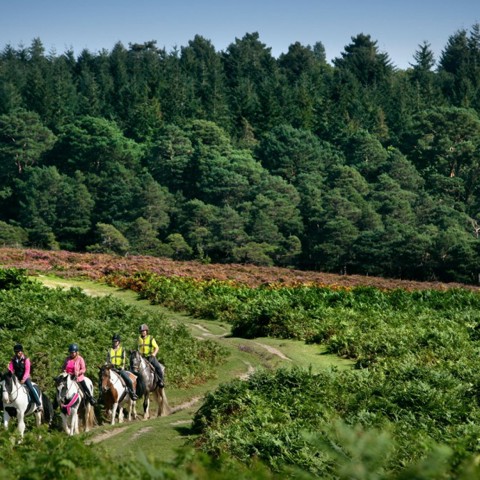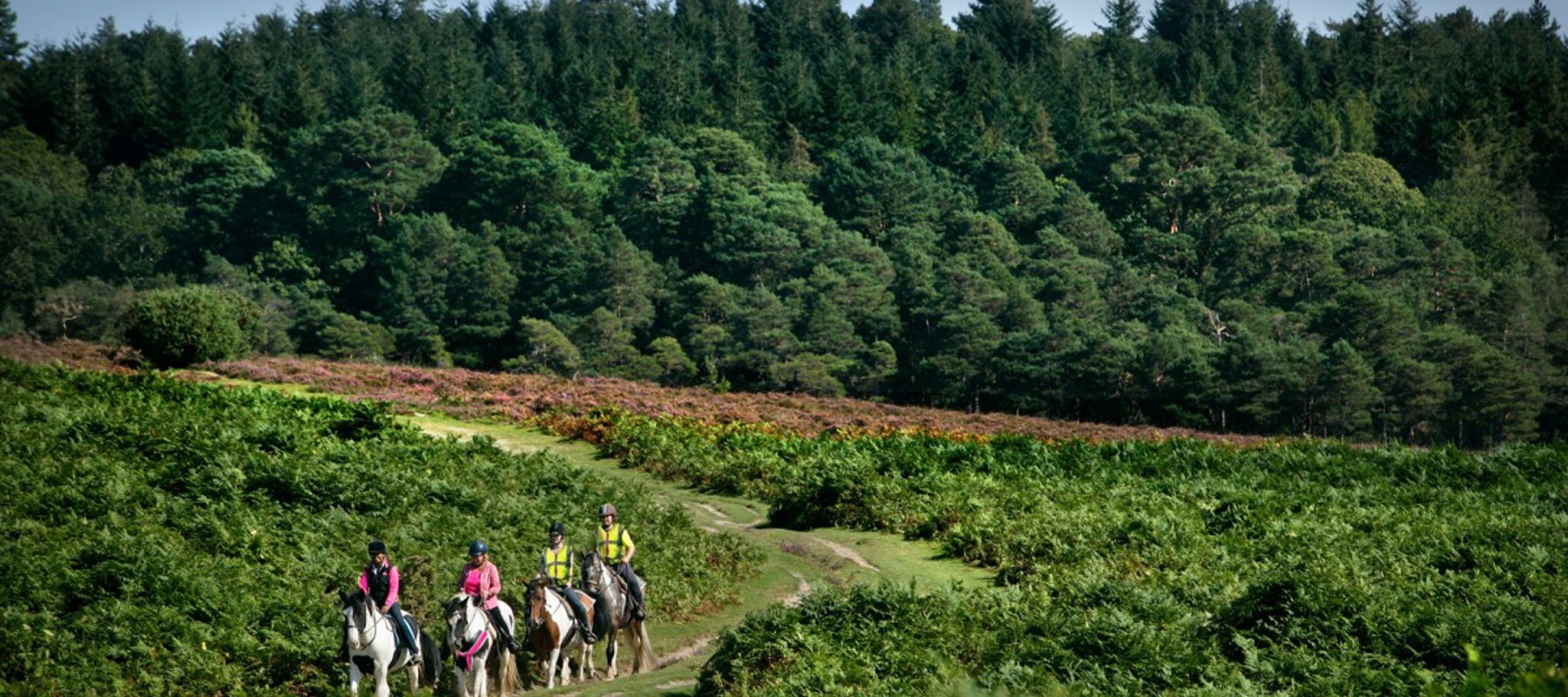Equestrian tourism is ideal for individuals who want to combine their passion for horses with working in the leisure industry. As you will be customer facing you must have excellent customer service and communication skills, enthusiasm and have a common-sense approach to your work. As the tasks asked of this role are often manual, and you may be in the saddle for long periods at a time, a good level of physical fitness is required.
How to get into equestrian tourism
The BHS Ride Leader Pathway is an industry recognised career route for anyone wishing to pursue a career in equestrian tourism. You will learn a variety of skills and a wealth of knowledge to support your chosen career, including horse husbandry, identification and handling skills, grooming and tacking up, horse health and nutrition, organising escorted rides, horse riding skills for escorting clients and customer service.
The minimum acceptable level of qualification for entry into employment as a ride leader is the BHS Stage 2 Ride Leader. If you hold this qualification, you will be able to enter employment at a centre and once employed you can work towards the BHS Stage 3 Trail Leader to develop your skills and knowledge.
The BHS Stage 4 Yard Manager qualification endorses your broad and in-depth knowledge and skills in managing a commercial business. Employers will be assured that you have the autonomy, skills and knowledge to manage a centre, and your clients will know that they are in safe hands with you.
You may find yourself working at a commercial centre that offers riding lessons as well as the usual tourism hacks and treks, particularly if working in the UK. Our Coach in Complete Horsemanship Pathway will help you develop the necessary skills to upskill and support a coaching element to your career.
Potential Careers
Ride leader
chevron-down
chevron-up
A ride leader is a generic term for someone who essentially can work as a groom at an equestrian centre, but also has the necessary skills to escort customers on hacks, treks or trails. This will likely include the usual tasks associated with caring for grass-kept or stabled horses and general yard duties will be part of a typical day for a commercial centre. You will also enjoy taking out groups of riders on hacks or treks whilst pointing out local landmarks and discussing local history. Think of yourself as a tour guide making the experience enjoyable and interesting for the rider. You will have responsibility for leading the trek and navigating the route, organising rest breaks for riders and horses and of course keeping everyone safe.
There will be more senior roles available for those that can take out longer treks and trails, fulfil the role of head groom and train junior team members.
Centre manager
chevron-down
chevron-up
The running of an equestrian tourism centre will be similar to any commercial centre, but with the additional leisure element. The centre may focus on hacking and holiday experiences rather than providing riding lessons. The centre could also offer accommodation and stabling/turnout for those that wish to bring their own horses.
This role would involve the supervision and management of staff, implementing yard protocols and best practice, health and safety standards, biosecurity measures and the training and development of junior staff. You would also be expected to manage the health care records for the horses (including worming, vaccinations, physio, saddle fitter, farrier, and equine dental technician).
You will be responsible for the maintenance of the facilities and equipment of the centre and implementing a grassland management plan for the upkeep of pasture. There may also be an element of invoicing, bookkeeping, accounting and business development.
Tour operators
chevron-down
chevron-up
If working day in day out at an equestrian centre doesn’t appeal to you, then a tour operator role just might. Imagine being paid to lead a ride in Patagonia, Namibia or India. An absolute dream! You will mainly be office based; helping your clients plan their once in a lifetime holiday, but then you will be the tour guide for your group of clients. You may be involved with booking package deals that include flights, accommodation and activities and day trips but most importantly you will be providing advice, guidance and assistance for someone planning their dream holiday.
You will need to have an extensive knowledge of the destinations you will be selling, so this role may involve ‘fact finding’ trips to seek detailed, specific information about the destination to help you provide a great service to your customers. Bear in mind that all responsible tour operators will only sell riding holidays to stables they have actually visited and vetted. Product knowledge is paramount.
Benefits
- Equestrian tourism centres are usually surrounded by fantastic countryside and beautiful views that you will see on a daily basis!
- Lots of riding
- You will meet new people all the time and enjoy the satisfaction of being a part of their fantastic holiday
Testimonials
Phil Cremer, Manager, Burley Villa School of Riding
chevron-down
chevron-up
There are plenty of opportunities for employment as a Ride Leader or Instructor, both full or part time and, as offsite riding is often seasonal, many centres also take on extra staff for holiday periods providing opportunities for college or university students who have the foresight to gain equestrian qualifications.
Ride Leaders and Instructors have a great responsibility to the business. Being the ‘front person’, they must ensure the client is kept safe at all times, is satisfied with their experience, that it meets or exceeds expectations and that any feedback or review they supply will be positive, a very important aspect especially for the business’ social media presence and word of mouth advertising. Both are main income generators for a business so a committed Ride Leader or Instructor, willing to help develop and expand trade, is a valued team member and, with BHS Pathways now offering a clear career progression, have very good prospects for their future in the equine industry.
Having the BHS Ride Leader qualification shows an employer that you have had the training to conduct their rides in a safe manner, you understand your responsibilities to the client and the employer, that you value customers and will do your best to ensure they have a positive experience and that you are very competent in the care of the stable's horses. If you present at an interview with these qualifications, I already know you understand your job, have the knowledge to carry it out and can hit the floor running from day one. To me, you are a professional and I am going to want to employ you.
My advice for anyone looking to get into this career path would be:
- Find a yard to train you whilst working towards your qualifications so you are ‘hands on’ and have practical experience to bring with you to your first or next employer. This might be as a volunteer, an apprentice or as an employed trainee.
- Take qualifications as soon as you can. Ride Safe and Stage 1 can be taken whilst still at school and give you a good base for your future training after school.
- Keep a good record of your equine experiences with basic detail and references so that you can present a good comprehensive CV on interview.
Mark Davison, Owner & Director, Venture Co Worldwide
chevron-down
chevron-up
It is essential that you have a thorough understanding of equine welfare in order to work in the “Overseas Riding Holidays” sector. This is because standards vary around the world, and there is no right or wrong way of looking after a horse. For example, compare horsemanship in India, the UK, Namibia and Argentina. The animal, the horse, is essentially the same, but the manner in which they are looked after differs widely. You need to be able to recognise a good regime from a poor regime.
In addition to sound riding competence, you will be more employable if you have a second language, travel experience, a first aid certificate and better-than-average geographical knowledge. An interest in wildlife is an advantage.
Overseas leaders earn £80 to £100 per day plus all expenses paid. Office-based roles start at £18,000 pa and rise to maybe double that.
BHS Stage 2 Foundation Coach in Complete Horsemanship indicates you understand horses. But there are many other skills that are equally important: inter-personal skills being the most important. This is essentially a service industry, so person-to-person communication skills are number one.
Working for a specialist horse riding tour operator is a daunting and demanding job; it’s also brilliant fun and all-absorbing. There’s a huge amount to learn, but even the learning is fun, and being sent overseas to experience the stable/horses/tack/equine management regime and peripheral activities is just the best homework in the world!


